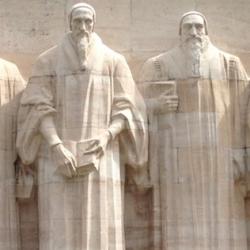The Reformers did not start out with a plan to establish separated churches. Their goal was to reform the entire Latin church. In this they failed.
The paradox is sharp, and we need to feel its point and its edge if we Protestants are to reckon honestly with our history during this year of celebration.
The Reformation was genuinely a recovery of the gospel. Scott Hendrix (Recultivating the Vineyard) has argued that the Reformation was an effort to re-evangelize and Christianize an officially but superficially Christian civilization. In many ways, they succeeded, setting the church and the world on an unprecedented course.
They blasted erroneous medieval theologies of grace that, in practice, encouraged people to believe that God helps those who help themselves. The Catholic church had never denied the priesthood of the laity, but the Catholic church had obscured and compromised it in many ways; the Reformers restored the biblical understanding of Christian priesthood. The Reformers trained ministers to teach the Bible, and taught the Bible to the laity; they developed institutions of oversight and discipline to ensure that Christians and their leaders were living Christianly. Partly (though not entirely) provoked by the Reformers, the Catholic church went through a significant reformation of its own.
Some have charged that the Reformers were willing to split the church because they had little interest in visible unity, but that is false. All the Reformers and all Protestant confessions stressed the unity and catholicity of the church. Calvin lamented the “mutilation” of Christ’s body.
Far from denying or downplaying the visibility of the church, the Reformation was an effort to make the church visible. The Catholic church was certainly visible, but what was visible was the church’s power and wealth and social prominence. Yet the essence of the church—the communion of the saints—was hidden. If you walked into a sixteenth-century Catholic church, you’d see a priest performing the Mass but you wouldn’t see the laity sharing the Eucharistic meal; if you walked into a Protestant church, you’d see the saints eating bread and drinking wine, holy ones receiving the holy things, the table communion of saints made visible.
All this merely sharpens the paradox of the Reformation. The Reformers recovered the gospel, and emphasized the unity and catholicity of the church as an implication of the gospel. Yet they left the church divided.
Continued at Theopolis.














